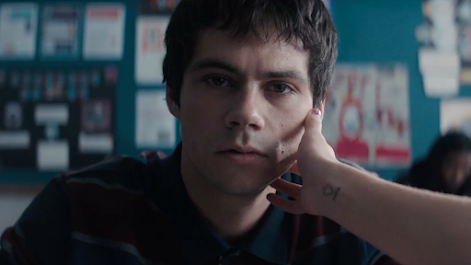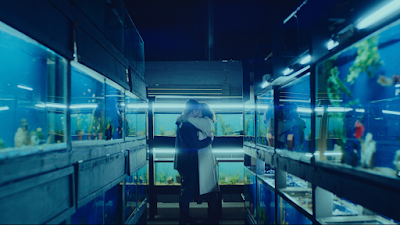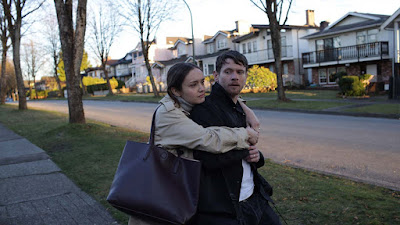Spoiler-free!
Saddled with the news that his mother no longer remembers him and will die in a few days, Fred (Dylan O'Brien) begins to fall away from his normal life, wife, and boring office job, going on a mental odyssey through his past to find out what happened to a girl he forgot he knew in high school, who vanished after they took a perception-altering drug the night before finals.
 |
| Written and directed by Christopher MacBride. |
This unexpectedly wise and thoughtful film is a drug trip movie—and it GOES FOR IT. Its focus on mentality and non-linear structure reminded me of Charlie Kaufman's writing. (I'm Thinking of Ending Things, Eternal Sunshine of the Spotless Mind) But instead of Kaufman's fantasy-like quirkiness, here it feels like science fiction, and goes so far into the weird, the trippy, and the unreal, that it touches on horror. It genuinely frightened me in a way a horror movie never has. It plays like suspense and drama, with nothing explicitly scary happening, but because of how hard in leans into the creepy side—this semi-scifi underworld that's down the rabbit's hole—it becomes effectively terrifying and disturbing on a mental level. Watching it felt like entering a shifted state of reality, or a nightmare that you think is real.
There is this glorious, relentless use of match cutting that I absolutely love. The plot tends to stay with two main timelines, and with the constant use of matching as the movie cuts from one time to another, the plotlines of past and present are tied closely together, to the point where they become one plotline rather than two. The bleak, subdued tone helps the suspense get under your skin, and the muted colors brings out the subtle ethereal quality. There's a masterful balance of information reveal. Though the plot is complex and ungrounded in physicality, it's intentional about the information, clues, and details it's giving you. I always knew what was happening, yet was always confused enough to want to understand more. It never explained itself in so many words, yet I always felt in sync with what it was saying.
Dylan O'Brien's acting skill continues to impress. I have this perception of him as an action lead, (which he cultivates, obviously) and certainly he's great at those, but that makes him an unusual choice for a movie about a mental journey. He brings his innate physically and high energy to this more subdued role, and it adds another whole layer to the project. His pressurized performance heightens what might become dry and flat under someone more low-key. Even though the movie is ethereal and bleak, there is an underlying sense of immediacy and urgency throughout, and O'Brien brings that out in a natural way while still being able to play into the dull discontentment of the character.
I got a lot out of it. Its themes and moral arguments, from my perspective, were brilliantly presented and never for one second preached. I felt like I was discovering it myself, as if I shared in Fred's revelation. Someone else may find the point or the main idea to be slightly different because of the subtlety, but whatever you may see, I think it is universally an encouraging conclusion—and emotionally rewarding to a degree few movies achieve. Even if you don't pick up exactly what I did, or exactly what it was laying down, there is clear intentionality behind the presentation. It was thoughtfully and indistinguishably woven into the story. The set-up hidden until the payoff, so we don't see where it's going until it gets there. And wise in choosing a destination.
Wise. It seems odd to use that word to describe a drug trip movie, but here we are—and I mean it. There is not only smarts and skill used in crafting this freaky, creepy, and heartfelt film, but wisdom, too.




